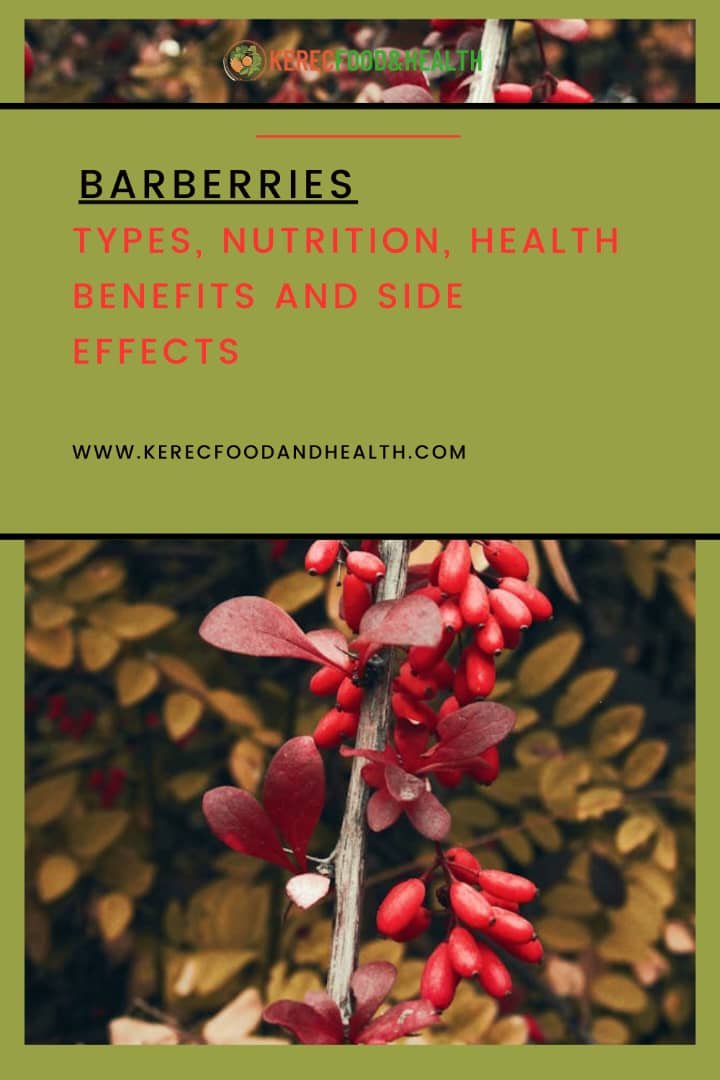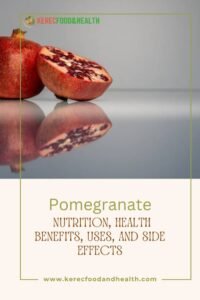Barberries, often hailed as a superfood, are small, nutrient-dense berries that offer a wealth of health benefits. Packed with antioxidants, vitamins, and minerals, these little powerhouses can play a significant role in promoting overall wellness. As we delve into the nutritional profile of bilberries, you will discover how they can support eye health, reduce inflammation, and enhance heart health. However, it’s essential to understand that even superfoods may have side effects. In this blog post, we will explore the comprehensive nutrition of barberries, examine their numerous health benefits, and discuss potential side effects to ensure you make informed choices about incorporating this berry into your diet. Join us as we uncover the remarkable qualities of bilberries and their impact on your health!
Nutritional Value of Barberries
Barberries (Berberis vulgaris) are small, tart red berries that not only add a unique flavor to dishes but also offer a range of nutritional benefits.
Below is the nutritional value of barberries based on a serving size of 100 grams (3.5 ounces):
- Calories: Approximately 50 calories
- Carbohydrates: About 13 grams
- Sugars: Approximately 4-7 grams
- Dietary Fiber: About 5 grams
- Protein: Approximately 1 gram
- Fat: Minimal fat content, around 0.5 grams
Vitamins
- Vitamin C: About 20 mg (33% of the Daily Value, DV)
- Vitamin E: Approximately 1.5 mg (7% of the DV)
- Vitamin K: About 2.1 µg (3% of the DV)
- B Vitamins: Includes several B vitamins such as B1 (thiamine), B2 (riboflavin), B3 (niacin), and B6,
Minerals
- Potassium: Approximately 230 mg (7% of the DV)
- Calcium: About 55 mg (6% of the DV)
- Magnesium: Around 10 mg (2% of the DV)
- Iron: Approximately 0.8 mg (4% of the DV)
Antioxidants and Phytochemicals
Barberries are rich in antioxidants, particularly berberine, which is a bioactive compound known for its antimicrobial and anti-inflammatory properties. Additionally, barberries contain flavonoids and polyphenols, which help combat oxidative stress and may reduce the risk of chronic diseases.
In conclusion, barberries are a nutrient-dense fruit that can contribute significantly to a balanced diet. Their rich vitamin and mineral content, along with dietary fiber and antioxidants, makes them an excellent choice for those seeking to enhance their nutrition. Whether incorporated into dishes or enjoyed as a snack, barberries offer a unique combination of flavor and health benefits.
Top 10 Health Benefits of Barberry
Barberries (Berberis vulgaris) may be small, but they pack a powerful punch when it comes to health benefits. These tart red berries have been used for centuries in traditional medicine, and recent studies have highlighted their numerous advantages. Below, we explore the top 10 health benefits of barberry, demonstrating why you should consider adding them to your diet.
1. Rich in Antioxidants
To start with, barberries are loaded with antioxidants, particularly berberine. Antioxidants help combat oxidative stress in the body, reducing the risk of chronic diseases such as heart disease and cancer. By including barberries in your diet, you can enhance your body’s ability to fight free radicals.
2. Supports Immune Function
Moreover, barberries are an excellent source of vitamin C. This essential nutrient plays a crucial role in strengthening the immune system. By boosting your body’s defenses, barberries can help you ward off infections and illnesses, particularly during cold and flu season.
3. Aids Digestive Health
In addition, the dietary fiber found in barberries promotes healthy digestion. Fiber helps regulate bowel movements and can alleviate constipation. Regular consumption of barberries can support gut health and improve overall digestive function.
4. Regulates Blood Sugar Levels
Transitioning to metabolic health, studies suggest that berberine, a key compound in barberries, may help regulate blood sugar levels. This can be particularly beneficial for individuals with diabetes or those at risk. By improving insulin sensitivity, barberries can aid in blood sugar management.
5. Promotes Heart Health
Furthermore, barberries can contribute to cardiovascular health. Their antioxidant properties help reduce inflammation and oxidative stress, which are risk factors for heart disease. Additionally, the potassium in barberries supports healthy blood pressure levels, further promoting heart health.
6. Enhances Skin Health
Barberries can also benefit your skin. The high levels of vitamin C and antioxidants can help combat skin damage caused by UV rays and pollution. Incorporating barberries into your diet can promote a healthy, glowing complexion and may even reduce the signs of aging.
7. Supports Weight Management
If you are looking to manage your weight, barberries can be a helpful addition to your diet. Their fiber content promotes satiety, helping you feel fuller for longer and reducing the likelihood of overeating. By incorporating barberries into meals and snacks, you can support your weight loss efforts.
8. Improves Liver Function
Moreover, barberries have been shown to support liver health. Berberine may help protect the liver from damage and improve its ability to detoxify the body. A healthy liver is essential for overall wellness, as it plays a critical role in metabolism and detoxification.
9. Reduces Inflammation
In addition, barberries possess anti-inflammatory properties, which can help reduce inflammation in the body. Chronic inflammation is linked to many diseases, including arthritis, heart disease, and diabetes. By incorporating barberries into your diet, you may be able to mitigate these risks.
10. Supports Mental Health
Finally, emerging research suggests that berberine may have positive effects on mental health. It has been linked to improved mood and cognitive function, potentially reducing symptoms of anxiety and depression. By supporting mental well-being, barberries can enhance overall quality of life.
Conclusion
In conclusion, barberries are a powerhouse of health benefits that can significantly enhance your well-being. From supporting immune function and digestive health to promoting heart health and mental wellness, these small berries pack a big nutritional punch. Consider incorporating barberries into your diet through jams, salads, or teas, and reap the benefits of this remarkable superfood!
Side Effects of Barberry
Barberries (Berberis vulgaris) are known for their numerous health benefits, including antioxidant properties and support for digestive health. However, like any supplement or food, they may come with potential side effects. Understanding these side effects is crucial to making informed decisions about incorporating barberry into your diet. Below, we discuss some of the most common side effects associated with barberry consumption.
1. Gastrointestinal Issues
First and foremost, one of the most reported side effects of barberry is gastrointestinal discomfort. Consuming large quantities of barberries can lead to digestive issues such as nausea, diarrhea, or stomach cramps. To mitigate this risk, it’s advisable to start with a small amount and gradually increase your intake.
2. Allergic Reactions
Additionally, some individuals may experience allergic reactions to barberries. Symptoms can include itching, rash, or swelling. If you have a history of allergies to berries or similar plants, it’s essential to proceed with caution. Always consult with a healthcare professional if you notice any adverse reactions after consuming barberries.
3. Blood Sugar Effects
Barberry, particularly due to its berberine content, can lower blood sugar levels. While this can be beneficial for individuals with diabetes, it may pose a risk for those without blood sugar issues. For instance, if you are taking medications to lower blood sugar, combining them with barberry may lead to hypoglycemia. Therefore, monitoring your blood sugar levels is crucial if you decide to incorporate barberries into your diet.
4. Interference with Medications
Furthermore, barberry can interact with certain medications. For example, it may affect the metabolism of medications processed by the liver, potentially increasing the risk of side effects. If you are on prescription medications, particularly those for diabetes or high blood pressure, consult your healthcare provider before adding barberry to your regimen.
5. Pregnancy and Breastfeeding Concerns
Moreover, pregnant or breastfeeding women should exercise caution when consuming barberries. While moderate consumption is generally considered safe, high doses may have adverse effects on pregnancy or lactation. Therefore, it is essential to consult a healthcare professional before consuming barberry in significant amounts during these periods.
6. Potential for Toxicity
In rare cases, excessive consumption of barberry can lead to toxicity. Symptoms may include severe abdominal pain, vomiting, and diarrhea. It’s important to remember that moderation is key. Always adhere to recommended serving sizes and avoid consuming concentrated barberry supplements without medical supervision.
Conclusion
In summary, while barberries offer numerous health benefits, it’s important to be aware of their potential side effects. From gastrointestinal discomfort and allergic reactions to interactions with medications, understanding these risks can help you enjoy barberries safely. Always consult with a healthcare professional if you have concerns about incorporating barberries into your diet, particularly if you have existing health conditions or are taking medications. By being informed, you can make the most of barberries while minimizing any potential risks.
Source
- https://www.healthline.com/nutrition/barberries#:~:text=It%20may%20help%20improve%20blood,taking%20supplemental%20barberry%20or%20berberine.
- https://draxe.com/nutrition/barberry/
- https://www.drugs.com/mtm/barberry.html
- https://www.verywellhealth.com/barberry-berberis-vulgaris-what-you-need-to-know-89546
- https://www.researchgate.net/publication/361852586_A_review_on_the_nutritional_composition_phytochemicals_and_health_benefits_of_barberry_An_insight_into_culinary_applications_and_future_prospects
- https://www.rxlist.com/supplements/european_barberry.htm





